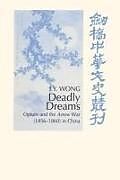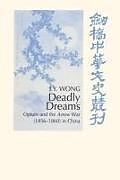Deadly Dreams
Einband:
Fester Einband
EAN:
9780521552554
Autor:
J. Y. Wong, Wong J. Y.
Herausgeber:
Cambridge University Press
Erscheinungsdatum:
24.11.2007
Klappentext The Arrow War (1856-60) involved all the world's major powers, and could almost be called a world war because of the global economic and diplomatic issues driving it. For twenty-five years Dr John Wong has been trying to discover the true origins of the war. What began as a study of an alleged insult to the British flag supposedly flying over the boat Arrow led to an analysis of complex Chinese and British diplomacy; of the even more complex Chinese tea and silk exports; of British India's jealously guarded economic strategies and opium monopoly; of cotton supplied to the Lancashire mills by the Americans, who thereby made up their trade deficit with China occasioned by their heavy purchases of tea; of intricate Westminster politics and British global trade; of French pride and cultural priorities; of Russian intrigues and territorial designs; and of America's apparent aloofness and real ambitions. Zusammenfassung Wong reveals the extent of Britain's reliance on the opium and tea trade with China, and argues that Victorian free trade ideology was a less decisive factor in the Arrow War (185660) than was Britain's economic struggle to support a vast colonial enterprise. Inhaltsverzeichnis Part I. The Confusion of Imperialism: 1. An attempt to peel the onion of confusion; Part II. The Pretext for Imperialism: 2. An international incident: 'that wretched question of the Arrow'; Part III. The Personalities of Imperialism: 3. Harry Parkes: 'if you would read a little international law.' - Punch; 4. Sir John Bowring: possessed by a monomania; 5. Commissioner Yeh: a 'monster'?; 6. Rule, Britannia and vox populi, vox Dei; Part IV. The Rhetoric of Imperialism: 7. Marx, Punch, and a political press: the debate among the British newspapers; 8. The Arrow incident and international law: the debate in the House of Lords; 9. Triumph of the liberal conscience: the debate in the House of Commons; 10. 'Johnny is on his knees': the 'Chinese Election'; Part V. The Mechanics of Imperialism: 11. Behind the scenes: the diplomacy of imperialism; 12. Behind the scenes: the politics of imperialism; 13. In the wings: the lobbies of imperialism; Part VI. The Economics of Imperialism: 14. Anglo-Chinese trade: the Chinese should buy more; 15. China's maritime trade: the Chinese could buy more; 16. The problem of India: the Chinese should and could buy more; 17. The balance sheet: the Chinese are now buying more; Part VII. The Dynamics of Imperialism: 18. Conclusion....
Zusammenfassung
Wong reveals the extent of Britain's reliance on the opium and tea trade with China, and argues that Victorian free trade ideology was a less decisive factor in the Arrow War (185660) than was Britain's economic struggle to support a vast colonial enterprise.
Inhalt
Part I. The Confusion of Imperialism: 1. An attempt to peel the onion of confusion; Part II. The Pretext for Imperialism: 2. An international incident: 'that wretched question of the Arrow'; Part III. The Personalities of Imperialism: 3. Harry Parkes: 'if you would read a little international law.' - Punch; 4. Sir John Bowring: possessed by a monomania; 5. Commissioner Yeh: a 'monster'?; 6. Rule, Britannia and vox populi, vox Dei; Part IV. The Rhetoric of Imperialism: 7. Marx, Punch, and a political press: the debate among the British newspapers; 8. The Arrow incident and international law: the debate in the House of Lords; 9. Triumph of the liberal conscience: the debate in the House of Commons; 10. 'Johnny is on his knees': the 'Chinese Election'; Part V. The Mechanics of Imperialism: 11. Behind the scenes: the diplomacy of imperialism; 12. Behind the scenes: the politics of imperialism; 13. In the wings: the lobbies of imperialism; Part VI. The Economics of Imperialism: 14. Anglo-Chinese trade: the Chinese should buy more; 15. China's maritime trade: the Chinese could buy more; 16. The problem of India: the Chinese should and could buy more; 17. The balance sheet: the Chinese are now buying more; Part VII. The Dynamics of Imperialism: 18. Conclusion.

Leider konnten wir für diesen Artikel keine Preise ermitteln ...
billigbuch.ch sucht jetzt für Sie die besten Angebote ...
Die aktuellen Verkaufspreise von 6 Onlineshops werden in Realtime abgefragt.
Sie können das gewünschte Produkt anschliessend direkt beim Anbieter Ihrer Wahl bestellen.
Loading...
Die aktuellen Verkaufspreise von 6 Onlineshops werden in Realtime abgefragt.
Sie können das gewünschte Produkt anschliessend direkt beim Anbieter Ihrer Wahl bestellen.
| # | Onlineshop | Preis CHF | Versand CHF | Total CHF | ||
|---|---|---|---|---|---|---|
| 1 | Seller | 0.00 | 0.00 | 0.00 |
